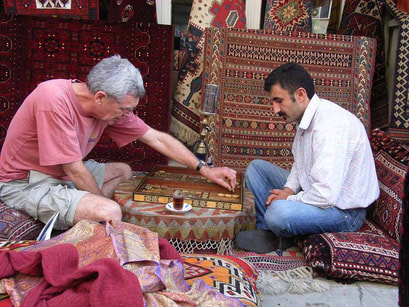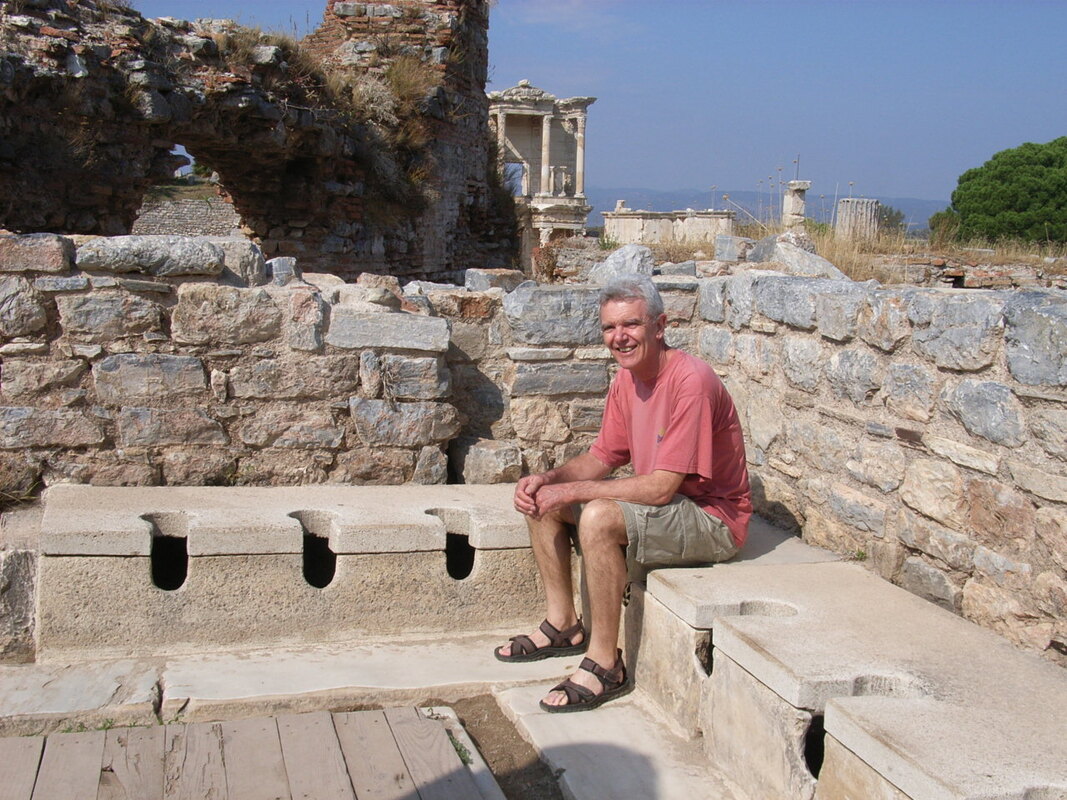 Harry Freeman’s cautionary tale about a game of backgammon with a Kurdish carpet seller in Turkey which nearly ended his marriage
Harry Freeman’s cautionary tale about a game of backgammon with a Kurdish carpet seller in Turkey which nearly ended his marriage HAVE you ever been to Ephesus?
It’s one of those magical places that time and the world have literally passed by. A slow, winding river (appropriately known for many centuries in various languages as ‘the Little Meander’) carries sediment from the local hills, past the town and sets it down further and further to the west forming a new coastline as it goes. So what was for centuries a bustling and important seaport is now several kilometres inland and no ship has been able to drop anchor in its harbour for well over a thousand years.
But for many centuries previously the quayside at Ephesus received visitors from many lands, including such notable figures from history as Alexandra the Great, who was welcomed with pageantry into the city after his first major victory on his way to conquering the Persian Empire, and Cleopatra, who came here with Mark Anthony to assemble a massive fleet in their forlorn attempt to become the rulers of Rome.
Today the pavements of Ephesus still reverberate to the footsteps of visitors. However, nowadays the feet belong to the more than two million tourists from around the world who visit each year to marvel at the city’s wonders. Many of them still arrive by sea, but they sail in on cruise ships which dock at Kuşadasi, a short bus drive away.
What have they come in their droves to see? Well, for the most part – ruins. The region is subject to the occasional earthquake: and what’s more, in the third century of the Common Era, the Goths paid a visit and in their usual heavy-handed way, knocked things about a bit, and left without repairing the damage – (rather like an unwanted Airbnb crowd these days on a larger scale).
But the ruins themselves are intriguing. It’s the sort of place where you can let your imagination run riot as you conjure up the sights, sounds, and smells of what was for a long time the most important city in Asia Minor, with a population of 250,000 or so at its peak.
And not everything is in ruins. There are still many magnificent structures which have either withstood the ravages of time or have been carefully rebuilt. Among such marvels there is the exquisite façade of the library, the third largest in the Roman Empire, which was meticulously restored in the 1970s. Its interior contained a spacious, well-lit reading room in which you could have made your selection from some 16,000 scrolls.
Or you can sit on the seats in the glorious theatre, once occupied by audiences of up to 24,000. The structure boasted an elaborate three-level stage and provided audiences with not only a magnificent venue in which to enjoy the Greek and Roman classics but also a stunning vantage point to watch the sun set along the main entrance into the city from the port and out into the Aegean Sea beyond.
If you need a moment to sit and ponder, you can go, as the ancients did regularly, to another communal area, best described as alfresco dunnies. From what remains, it seems the Romans lived up to their reputation of being pioneering engineers by inventing the (constantly) flushing toilet. However, their imagination had limitations and didn’t run as far as cubicles, or even a roof!
Selcuk, itself, is a fascinating place. There is a spot, a short walk from the town centre, where you get a view which sets history buffs’ pulses racing and encapsulates for me just why this area has been a major crossroads for humanity over the centuries. What you can see are four buildings, or their remains, from four distinct eras. On a hill above the town is the church of St John, the saint who was one of Jesus’s twelve disciples. He is reputed to be buried there having come to the area to write his Gospel. Then, if you move your gaze to the left a little, there is another hill crested by an imposing, well-preserved Byzantine fortress; further down this slope is a 14th Century mosque, one of the oldest and most impressive in the whole country.
And then, directly in front of you are two incomplete, broken pillars and a few other ruins. This is the least prepossessing, but for me the most fascinating, of the sights in view. What you are looking at is all that remains of one of Seven Wonders of the Ancient World, the Temple of Artemis. The temple itself had been destroyed and rebuilt more than once and finally met its end as an act of deliberate vandalism. It was set on fire, reputedly by a madman who did it to get his name remembered. Well, Herostratus may not be a name that’s on everyone’s lips, but it is definitely in the records, and is read regularly by visitors to the site of his desecration every day, so, you could say he was successful in his aim.
It was in Selcuk that we met the carpet seller mentioned in the introduction. After spending some time recovering from our journey, we went down into the town to explore. Of course, we had met many carpet sellers before. In fact, in Istanbul, it seemed that everyone we met had carpets to sell or, at least, had a cousin or two who did. The young man in Selcuk was rather different; not pushy for a start and ready to have a chat (over an apple tea of course) about his experiences growing up as a Kurd in Eastern Turkey. It was then I noticed the backgammon set and, having picked up at least rudimentary skills in the game, I offered to play him.
What followed could have been a scene from The Hustle if it hadn’t been conducted in a light-hearted way. Of course, I was allowed to win the first game, although not too easily; that would have been too obvious. And so the talk inevitably moved on to a return match involving maybe a wager.
I think I was offered the prize of a herd of goats or maybe a camel. In return my mind turned to what I had to offer of value. We were backpacking at the time, so my most valuable possession at that moment was my wife.
Of course, this time, things didn’t turn out so well for me and the carpet seller was victorious. Fortunately, he was easily persuaded to accept an alternative reward and we bought a carpet from him instead which we still walk on every day.
It was, I think, a win-win-win situation. He was happy to make a sale; I was certainly mightily relieved to still have my wife – and I think she was happy to maintain our marital situation.
At least that seemed to be the case the next day when the Belgian who gave us a lift to Ephesus made a pass at her…
.. but that’s another story!
